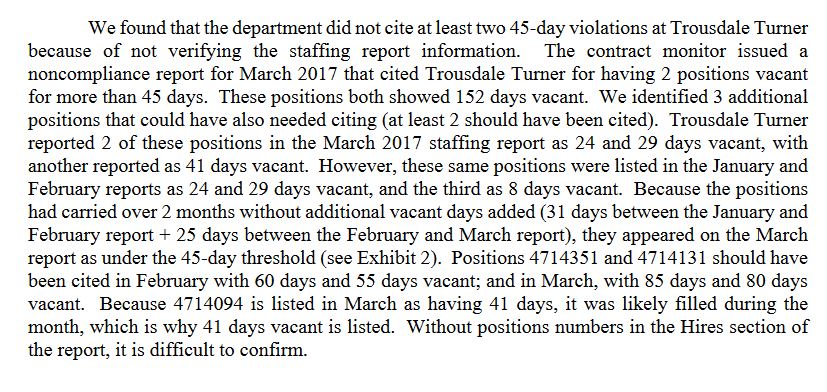INMATE’S “ACCESS TO THE COURTS” LAWSUIT MADE PUBLIC
by Sharon Rondeau

(Dec. 20, 2017) — The repeated claims of TDOC inmate Robert Z. Whipple, III, #399615, of denial of access to the law library at the Bledsoe County Correctional Complex (BCCX) in Pikeville, TN were included in an article in the Chattanooga Times Free Press (CTFP) dated December 7, 2017.
While the article focused on the Hamilton County “penal system” specifically, it invoked an audit report released last month by the Tennessee Comptroller of the Treasury citing serious deficiencies within Tennessee’s private prisons, run by CoreCivic, with some responsibility extending to the Tennessee Department of Correction (TDOC), which oversees both private and state-run facilities.
BCCX is a state-run facility. Over a period of months, Whipple has described to this publication having been denied his prescription for acid reflux disease and another for diabetic shoes in addition to a denial of access to the law library, as CTFP’S Zachary Peterson reported.
“Ever since he filed a lawsuit against the Tennessee Parole Board that also named Bledsoe’s warden, 42-year-old Robert Z. Whipple said the guards have denied him and 120 or so inmates from accessing the law library. That area has legal texts and a computer terminal to search for specific cases, Whipple said, and they’re essential because he’s representing himself and has no other access to the courts,” Peterson wrote of Whipple’s complaint.
Quoted but unnamed is a TDOC “spokesman” who reportedly denied that TDOC inmates have been precluded from using the law library.
Whipple has told The Post & Email that his lawsuit against the Board of Parole stems from his scheduled parole, which he claims he merits but never occurred, keeping him in prison for years longer.
Inmates at TTCC often cited lack of access to the law library as a frequent and very frustrating challenge, one thought to have arisen from a severe staff shortage.
Whipple has filed a lawsuit against the TDOC over what he has alleged is a “denial of access to the courts” and other issues and has documented his complaints copiously in letters sent to this publication as well as to David Tulis, editor of Nooganomics.
On Tuesday, Taylor told Tulis that the department could not comment on the claims because of “pending litigation as it relates to offender Whipple.”
Along with its county jail, Hamilton County contains a prison for female inmates, the Silverdale Correctional Facility, another CoreCivic institution.
The Post & Email and WSMV in Nashville have published a plethora of reports from inmates, their relatives and some employees who have described substandard conditions within the CoreCivic-operated Trousdale Turner Correctional Center (TTCC) in Hartsville, the state’s newest prison. MCCX inmate Grenda Ray Harmer has described horrendous conditions at both TTCC and the CoreCivic-operated South Central Correctional Facility (SCCF) to include at least one inmate dying from a drug overdose.
While Peterson reported on the same day as his Hamilton County article that the recent state comptroller’s audit faulted CoreCivic facilities for understaffing and poor documentation, the audit report also points to “the department” for failing to “cite at least two 45-day violations at Trousdale Turner because of not verifying the staffing report information” (p. 20). The entire citation reads:

A “recommendation” on page 23 relating to the finding states, “The department’s monitoring staff should ensure that the information they receive from Core Civic is complete and accurate, and they should verify information, including vacancies and the length of time positions are vacant. If the reports are no t accurate, monitors should cite this in noncompliance reports until the issues are corrected. Additionally, the department may wish to require the number of filled positions and inmate population to be included in each report, so it can better determine the officer-to-inmate ratio, staff turnover rates, and vacancy rates.”
A discussion of the “turnover rate” of correction officers in general on page 24 of the audit focuses on “the department” and not only the CoreCivic-run facilities.
As TDOC spokeswoman Neysa Taylor has informed this writer, the TDOC monitors the state’s CoreCivic prisons on a “daily” basis.
While the audit supports the myriad of reports from inmates and relatives describing a very short-staffed TTCC, Taylor has said those allegations are “inaccurate.” She has not responded to our most recent request for comment about Harmer, who has reported “freezing” temperatures in his cell necessitating his wearing of four layers of clothing, a coat, two hats and gloves at all times and the admission by at least one correction officer that the cell is colder than it should be.
On a recent appearance on Tulis’s “Nooganomics” radio show, Tennessee State Rep. John Ray Clemmons said that “there is enough blame to go around” when asked if the problems within the state’s prisons are limited to CoreCivic institutions.
Peterson’s article on the Hamilton County jail enumerates the common thread of inmate complaints throughout Tennessee including “alleged poor medical care, limited access to legal materials and overcrowding…denied prescription drugs and inconsistent responses to medical requests,” phenomena reported by this publication for nearly three years since shortly after LCDR Walter Francis Fitzpatrick, III (Ret) was imprisoned in August 2014.

